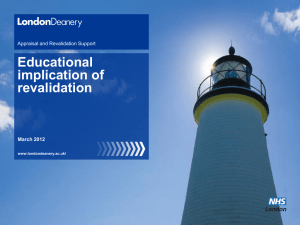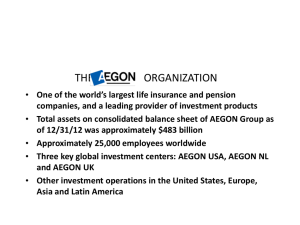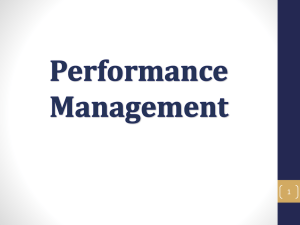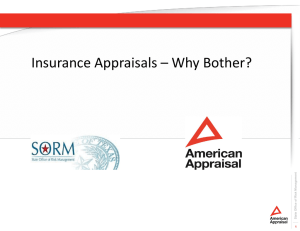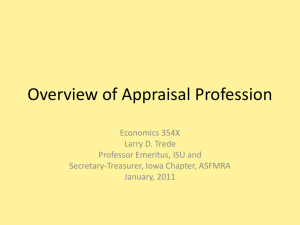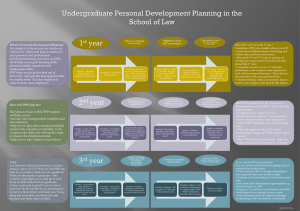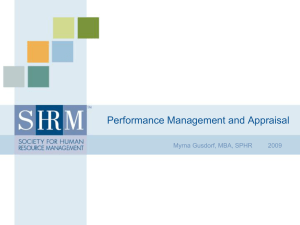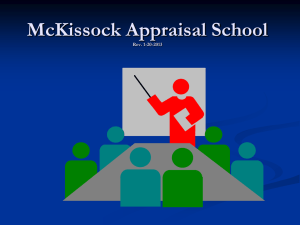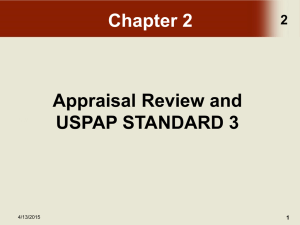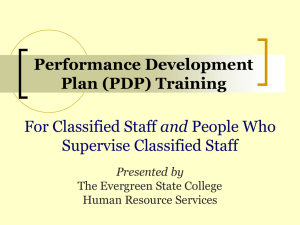GMC guidance - NHS England
advertisement
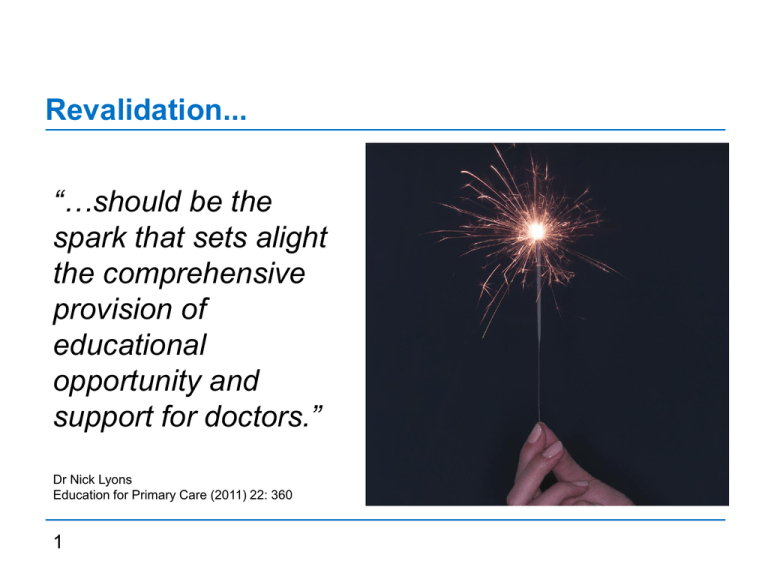
Revalidation... “…should be the spark that sets alight the comprehensive provision of educational opportunity and support for doctors.” Dr Nick Lyons Education for Primary Care (2011) 22: 360 1 New appraiser training Welcome back to day two Facilitators: Organiser: Date, Venue: All images used in this presentation are provided courtesy of the NHS photo library, Microsoft or other free clipart sites. Housekeeping 3 Ground rules • Confidentiality • Listen • Respect • Participate • Punctuality • Have fun! 4 Looking back to day one 5 Looking ahead to the partial appraisals: reflection and preparation 6 Rehearsing appraisal skills In your appraisal trios ……….. Time 09:30 Appraiser C Doctor B Observer A 10:15 B A C 11:00 11:15 Coffee A C B Finish exercise at 12:00 and go to lunch 7 Lunch 8 Conducting an appraisal Reflection 9 Looking at the personal development plan (PDP) 10 Why bother with a good PDP? Discuss: • What makes a good PDP? • What do you need as an doctor? • What do you need as an appraiser? 11 The PDP – hitting the target 12 What does the PDP look like? PDPs: all doctors need an agreed PDP • Links to summary of discussion and is driven by doctor • Needs ‘SMART’ objectives • Reflects the doctor’s approach to learning (not the appraiser’s) • ‘Quality not quantity’ of entries, as some doctors find PDPs less useful than others, and learning styles vary • Not everything needs to go on the PDP – indeed, ‘agreed actions’ should be captured for each doctor in the summary • Doctors need to focus on real needs, identified in a structured and objective way, rather than perceived needs 14 SMART(IES) objectives • • • • • • • • S M A R T I E S Specific Measurable Achievable Relevant Timely Interesting Economic Shared success Making the PDP specific to the doctor Activist Experiencing Pragmatist Planning & applying Reviewing Reflector Concluding Theorist Honey & Mumford, 1992 PDP task As an individual derive an appropriate PDP objective for yourself – either from the discussion this morning or as a new appraiser Remember: PDP objectives should be SMART(IES) 17 Why bother with a good summary of appraisal? • For the doctor • For the appraiser • For the responsible officer Discuss: • What makes a good summary? • What do you want as a doctor? • What do you want as an appraiser? • What should the ‘service’ expect? 18 The summary of appraisal The appraisal summary should cover for each domain: • an overview of the supporting information and the doctor’s accompanying commentary • comment on the extent to which the supporting information relates to the doctor’s scope and nature of work. The general summary should include key elements of the wider appraisal discussion (particularly those arising from the information shared in section 12 – Achievements, Challenges and Aspirations) and any actions agreed that have not already been recorded. Supporting Information for appraisal and revalidation (GMC, 2011) 19 PROGRESS and EXCELLENCE QA tools Appraiser: Quality Assured by: Date 1 2 3 PROGRESS QA tool Quality assurance and development of appraisal documentation Score (out of 20) Comments 0-2 (absent – well done) 0-4 (absent – well done) 1 2 How can the appraiser improve the appraisal documentation? 3 Appraisal identifier (initials) PROFESSIONAL (2) – is typewritten, objective, free from bias or prejudice, describes a professional appraisal: venue, time taken, good information governance, no identifiable third party info 1 REFLECTS A GOOD APPRAISAL DISCUSSION (4) – demonstrates support, challenge and focus on the reflection and needs of the doctor 1 2 3 2 3 OVERVIEW (2) – includes a description of the whole scope of work and context for the doctor, the appraisal and the revalidation cycle 1 2 3 GAPS (2) – identifies any gaps in requirements for revalidation or scope of work and specifies how they will be addressed (or states if no gaps) 1 2 3 REVIEWS SUPPORTING INFORMATION (SI) AND LESSONS LEARNED (4) – reviews SI in relation to Good Medical Practice; comments on SI not supplied electronically and any information the doctor was asked to bring. Reflects on lessons learned, changes made and actions agreed. 1 ENCOURAGES EXCELLENCE (2) – affirms good practice, celebrates achievements and actions accomplished, gives examples of good practice and records aspirations (some of which may have a timescale over one year) 1 SIGN OFFS & STATEMENTS (2) – ensures the input and output statements, including health and probity, have been completed, commented on and, where appropriate, explanation made to the RO 1 SMART PDP (2) – PDP objectives arise from the SI and appraisal discussion and are SMART: Specific, Measurable, Achievable, Relevant and have a Timescale 1 TOTAL Overall impression: 20 2 3 2 3 2 3 2 3 PROGRESS vs. EXCELLENCE P R O G R Professional Reflects a good appraisal Overview Gaps Reviews supporting information and lessons learned E Encourages excellence S Sign Offs & Statements S SMART PDP 21 E Encompasses all X Excludes bias and prejudice C Challenge, support and encourage E Explain statements L Look at supporting info and lessons learned L Look at last year’s PDP E Encourage excellence N Note any gaps C Contain a SMART PDP E Explain the new PDP Summary of appraisal task • Look at the example summaries and PDPs provided • Quality assure the write up for Dr No Concerns first, using the QA tool provided • Now that you are familiar with the tool, QA the outputs of Dr Part Time and / or Dr Been Ill What have you learned? 22 There’s no such thing as… • A perfect summary of discussion • A perfect PDP • A perfect appraisal But… …we are all striving to improve. 23 Tea/coffee 24 Preparing for difficult medical appraisals • Identify potential areas of difficulty within the appraisal process • Understand the possible causes for these difficulties • Develop strategies for dealing with difficult appraisals 25 Appraiser concerns 26 What doctor problems could make an appraisal difficult? • Preparation • Too much or too little documentation, supporting information or reflection • Attitude • Arrogant/cynical/dependent/disengaged • Special cases • Poor performance • Conduct issues • Illness • Whistleblowing 27 Preparation: time to postpone the appraisal? • Potential conflicts of interest (allocate a different appraiser) • No pre-appraisal documentation/illegible documentation • Late receipt of pre-appraisal documentation with no time to prepare • No previous summary of appraisal or PDP from last years’ appraisal • Inadequate supporting information • Unsuitable venue • Lack of protected time 28 Attitude – don’t take it personally! 29 Special cases Try as far as possible to crystallise: • Are patients at risk? • Should the appraisal continue? • What action are you going to take? • How you can signpost clearly the next steps to doctor. Sometimes it is appropriate for the appraisal to continue but for the appraiser to take action in the way that the appraisal is written-up or the appraisal statements are signed-off 30 Summary –reality is complex • In practice, doctors do not conform to stereotypes (unless they are choosing to play a single role). • Difficult appraisals will usually involve a mixture of some of these attitudes and behaviours. • The high flying doctor may also produce too much meticulously organised paperwork and then reveal that it is all fuelled by alcohol as a stress reliever. • Being an appraiser is a privilege but it is not easy and there are no perfect answers. 31 What potential pitfalls do you recognise for yourself as an appraiser? The people pleaser The elder statesman The head teacher The rescuer The perfectionist The judge The diffident The task oriented The doctor The money oriented The over-involved/colluder 32 Being self-aware • Acknowledge that personal stumbling blocks exist • Do not let them get in the way of delivering an effective appraisal • Rehearse alternative strategies within an appraisal support group or network • Reflect on and discuss difficult appraisals after they have occurred (in terms of process, not specific content) to gain useful insights 33 Before each appraisal Be self-aware Be doctor aware What are my personal pitfalls to beware? What issues of preparation or attitude might I have to challenge here? If there are no apparent issues, how can I add value to this appraisal? 34 Handling unexpected serious concerns arising during the appraisal discussion Discussion: • The requirement to suspend an appraisal discussion because of a serious concern is not new • It is exceptionally rare for such a serious concern to arise during the appraisal discussion that the appraiser needs to take off the ‘appraiser hat’ and move into other processes. Exercise: • A chance to try out different ways of reacting to a doctor who reveals something for the first time during appraisal that raises serious concerns about their conduct, capability, or health. 35 Local processes and specialty specific issues • • • • • • • Appraisal leadership and support Appraisal policy Occupational health and poor performance procedures Whistle-blowing policies What does your designated body advise? What does your royal college or faculty advise? Are you clear about how this links to the GMC requirements for revalidation? • Any other issues? 36 Questions and answers 37 Evaluation forms • We welcome all constructive feedback. • If anything is unclear and you wish us to get back to you, please put your name and contact details on the form. • Remember that you need to look again at the self assessment of competencies and mark whether your confidence has changed as a result of the training today. • Thank you for your participation. 38 Delivering a supportive and challenging medical appraisal is worth the effort Thank you for your hard work 39

